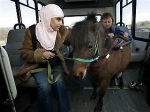10 April 2009
Tiny Horse Trains as Guide for Blind Muslim Woman
 DEARBORN, Mich. — Mona Ramouni seems more nervous than Cali as they ride the rattling bus to work for the first time.
DEARBORN, Mich. — Mona Ramouni seems more nervous than Cali as they ride the rattling bus to work for the first time.
You're a good girl, you're OK, you're OK," Ramouni says softly, stroking Cali — a 3-year-old former show horse that stands about 2 1/2 feet tall, weighs about 125 pounds and has trained since November to become Ramouni's guide.
Ramouni lost her sight to retinopathy of prematurity shortly after birth. She relies on her family to guide her around the Detroit suburbs where she's lived, studied and worked for all of her 28 years.
She wants more independence, but a traditional guide dog isn't an option. Many Muslims consider dogs unclean, and Ramouni, an observant Sunni, respects her Jordanian-born parents' aversion to having a dog in the home where she lives along with three of her six siblings.
The answer, she hopes, is Cali, short for Mexicali Rose.
"I want a horse that will be a partner for the next 30 or so years. This is a really awesome little horse ... and what I really want is to be able to take her places and go places with her that neither of us ever would have been able to do without each other," Ramouni says.
Still, "there would be concerns about bringing a horse into certain establishments and areas of worship as well," he says.
There are only a handful of the miniature animals trained as guides for the blind in the United States. Cali's trainer, Dolores Arste, knows of five others.
"Taking on a horse as a guide is a huge commitment, same as a dog but with more physical needs," Arste, 61, says. "It is not a novelty. It is a real working animal."
The horses can live into their 30s, more than twice as long as most dogs, Arste says.
Ramouni says she was a "typical horse-crazy little girl." She heard about guide horses as an adult and eventually connected with Arste, who earlier helped train a guide horse.
A breeder offered Cali as a guide and the training began for both the horse and Ramouni. Ramouni paid for the horse, $450 a month for Arste's training and other expenses out of her savings.
Since Ramouni had never used a dog, she had to learn how to control a guide animal. She was partially successful at training a pet dwarf bunny named Baylea — "she does come when I call her," Ramouni says — and has worked hard with Cali.
"I've never met a young woman with so much dedication," Arste says.
Arste trained Cali partly in Hatfield, Ark., and partly in Saratoga Springs, N.Y., teaching the horse how to get in and out of vehicles, guide through crowds and stand still indoors.
Cali first came to Dearborn in December, but her three-day trip this week was a more important test. Ramouni took on responsibility for caring for the animal as it led her through her daily routine, including Thursday morning's commute on a public bus from her Dearborn home to the Lincoln Park office where she proofreads textbooks in Braille.
Additional training may take an additional two months before Cali can join Ramouni for good, taking up residence in a newly erected shed on Ramouni's lawn.
Ramouni says having Cali as a guide opens up new opportunities, but the U.S. government may soon tighten the definition of a guide animal under the Americans with Disabilities Act to exclude farm creatures such as horses. Regulatory language that would limit guide status to dogs and other common domestic animals was proposed last year, but was postponed along with other new federal rules when President Barack Obama took office in January.
The new ADA regulations are under review and final language will be issued later this year, according to Justice Department spokesman Alejandro Miyar.
In the meantime, Ramouni, a graduate of the University of Michigan-Dearborn, says she hopes to pursue a doctorate in child psychology at the university's main campus in Ann Arbor.
The benefits go beyond the practical, she says.
Before Cali, "I had basically given up. I mean, I had been to the point where I thought, 'I'm going to get nothing out of my life,"' Ramouni says. "And having Cali ... showed me that I had forgotten about all the optimism I had as a kid. When I was a kid, I thought I could do anything. I thought everything was possible."
posted by // http://www.foxnews.com
15:56 Posted in UNITED STATES | Permalink | Comments (0) | ![]() Facebook |
Facebook |



















The comments are closed.